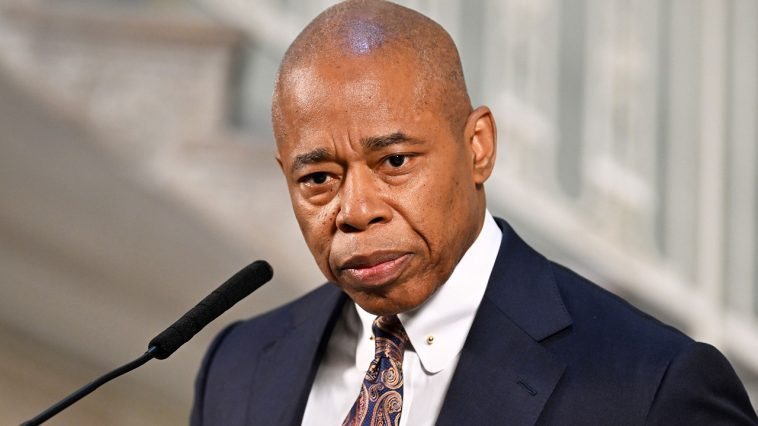In Newburgh, New York, a group of migrants participating in a relocation program organized by New York City is set to arrive at a local hotel. The press secretary for New York City Mayor Eric Adams has not provided a specific arrival time for these migrants. Town Supervisor Gil Piaquadio was not given an estimated time for their arrival either. This relocation is part of an effort to ease the strain on New York City caused by a continuous inflow of migrants over the past year and an anticipated increase after a pandemic-era immigration policy expires.
Roughly 400 asylum seekers are expected to be moved to Orange and Rockland counties as part of the plan. However, leaders in these Hudson Valley counties have resisted Mayor Adams’ proposal. Orange County Executive Steve Neuhaus and Rockland County Executive Ed Day declared states of emergency, banning hotels and motels from accommodating the migrants.
Additionally, Town Supervisors Gil Piaquadio and Teresa Kenny of Orangetown argue that the proposed extended stays, which could last up to four months, violate town codes limiting hotel and motel stays to 30 days. Town officials in Newburgh hand-delivered notices to local hotels and motels regarding permissible uses under these regulations, and warned that the town would “take whatever corrective action is necessary” should the code be violated.
Town Supervisor Piaquadio points out that New York City must comply with a set of procedures when proposing a use within another jurisdiction, and he believes the city should follow these protocols in this situation. The relocation plan faces opposition at the state level as well. Governor Kathy Hochul declared a state of emergency Tuesday afternoon, albeit for different reasons than the county executives.
Governor Hochul’s order aims to expedite the distribution of $1 billion in funds, secured through the recently enacted state budget, to address this pressing humanitarian crisis. The asylum seekers were expected to be divided between Orange and Rockland counties, with 60 scheduled for placement at the Crossroads Hotel in Newburgh and over 300 at the Armoni Inn & Suites in Orangetown, Rockland County.
Mayor Adams’ program would afford these migrants up to four months of lodging at these hotels, with New York City covering the costs of food, shelter, and resources. However, last night a Rockland County Supreme Court judge issued a temporary restraining order, requested by Orangetown officials. They argued that the Armoni Inn & Suites’ land-use permit and certificate of occupancy do not permit them to house migrants for such an extended duration.
As a result of this restraining order, New York City has temporarily halted the relocation of migrants to Rockland County. Mayor Adams’ press secretary, Fabien Levy, stated that they will wait for the hotel in Rockland County to decide its next move, but their plan is still to move a small number of asylum-seekers to Orange County barring any security issues.
According to Mayor Adams’ office, more than 60,800 asylum-seekers have traveled through New York City since last spring, many of them bused from Texas by Governor Greg Abbott. Over 37,500 asylum-seekers are currently in the care of New York City. The expiration of Title 42, which allows the United States to reject asylum-seekers without a hearing, is approaching on May 11.
While Title 42 has existed as public health services law since 1944, it was first invoked by former President Donald Trump during the early stages of the COVID-19 pandemic to mitigate the virus’s spread. With this policy set to expire, federal authorities have warned of a potential surge in immigration at the U.S.-Mexico border.
The proposed relocation of migrants to the Hudson Valley through Mayor Adams’ program would alleviate pressure on New York City’s resources and create space for more immigrant arrivals after Title 42’s expiration. Nevertheless, the plan has faced strong opposition since its formal announcement.
Rockland County Executive Ed Day and the mayor have publically exchanged criticisms, with Day arguing that Rockland lacks the infrastructure necessary to support hundreds of new arrivals. In response, representatives of Mayor Adams have accused Day of demonstrating poor leadership and a lack of compassion.
Defending New York City’s efforts, Press Secretary Fabien Levy stated that the city has cared for more than 61,000 migrants by providing shelter, food, and care without major incidents. Levy emphasized the need for the federal government and other elected officials across the nation to play their part.
Regarding Rockland County, Levy criticized Executive Ed Day’s inability to manage even a fraction of the asylum seekers New York City has taken in thus far. Despite the city covering costs for shelter, food, and services, Levy was dismayed by Day’s apparent deficiency in providing humane and compassionate care.
In summary, the continued influx of migrants and the impending expiration of Title 42 are causing pressure on New York City’s resources. Mayor Eric Adams’ plan to relocate hundreds of migrants to the Hudson Valley attempts to address the problem. However, the plan has been met with resistance from local officials and legal roadblocks, leaving the future of this strategy uncertain.
Ultimately, the ongoing debate highlights a larger issue concerning the responsibilities of various levels of government in addressing the needs of migrants and asylum-seekers. As the nation grapples with immigration-related challenges, it remains essential for elected officials to collaborate, find effective solutions, and uphold the humane treatment of those seeking refuge on our shores.


